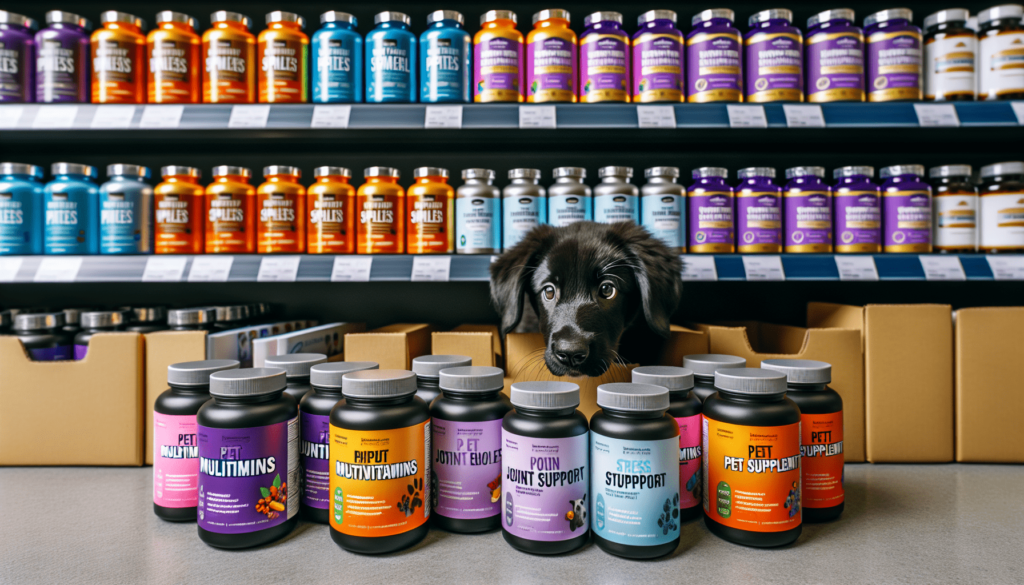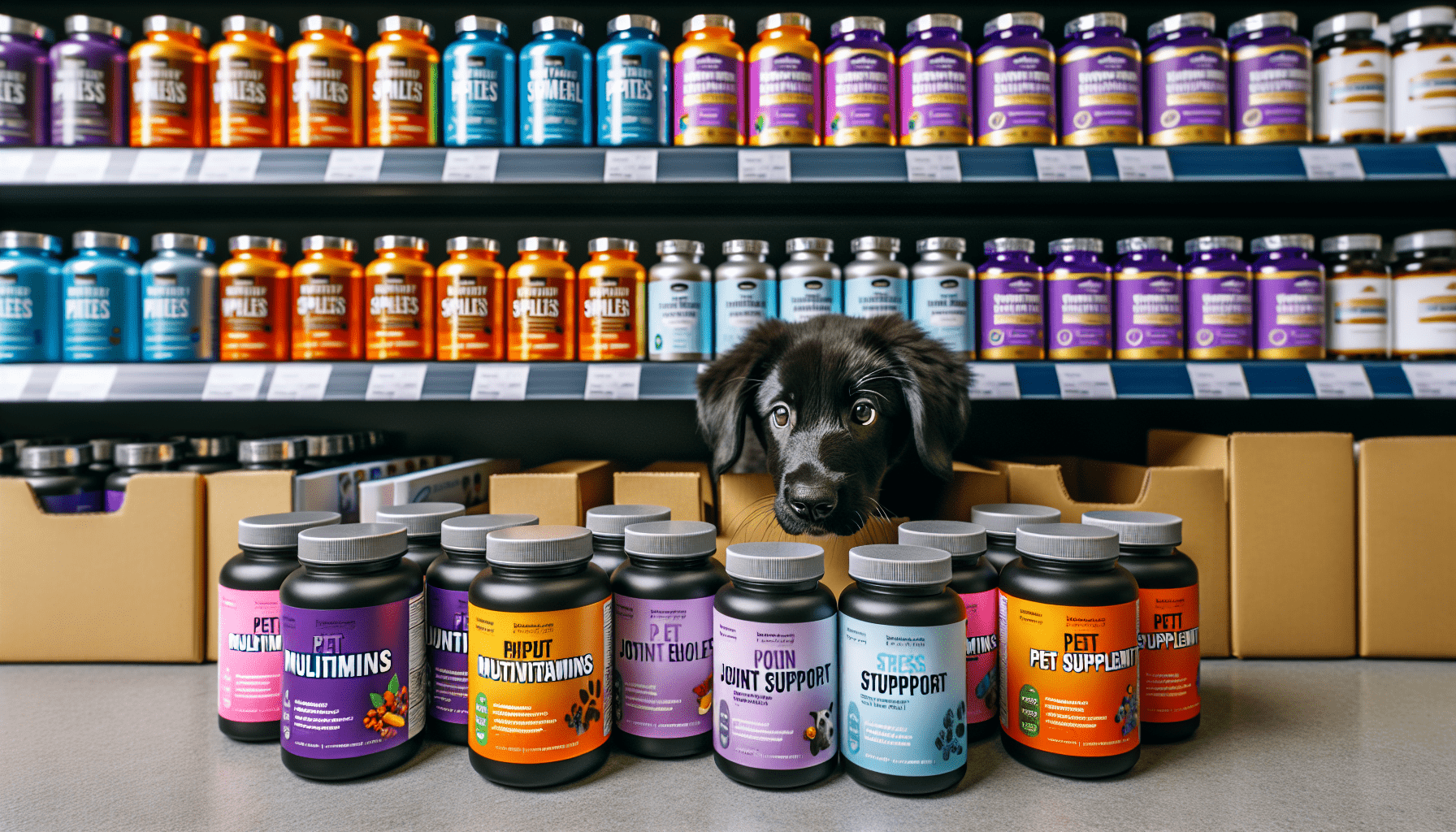You’re probably well aware of how important it is to keep your furry friend healthy and happy. That’s why it’s no surprise that the market for pet supplements is booming. Pets, just like humans, can benefit from a little extra support in their overall well-being. From joint health to shiny coats, these supplements offer various benefits that can enhance your pet’s quality of life. As more and more pet owners recognize the value of these products, the market of pet supplements is experiencing rapid growth. So, let’s explore the exciting world of pet supplements and discover how they can help your beloved companion thrive.
The Benefits of Pet Supplements
Pet supplements have become increasingly popular among pet owners due to the various benefits they offer. These supplements provide improved nutrition, joint and bone health support, skin and coat care, and digestive health benefits for our furry friends.
Improved Nutrition
One of the key benefits of pet supplements is improved nutrition. These supplements contain essential vitamins, minerals, and antioxidants that help bridge the nutritional gaps in your pet’s diet. They provide necessary nutrients that may be lacking in their regular food, ensuring that your pet receives a well-balanced diet.
Joint and Bone Health
As pets age, they may experience joint and bone issues, such as arthritis or stiffness. Pet supplements designed for joint and bone health contain ingredients like glucosamine and chondroitin, which help support healthy joints and cartilage. Regular use of these supplements can improve mobility and comfort, allowing your pet to lead a happy and active life.
Skin and Coat Care
Pet supplements focused on skin and coat care can significantly improve the overall appearance and health of your pet’s fur. These supplements contain omega-3 fatty acids, which help nourish the skin, reduce dryness, and enhance the coat’s shine. By incorporating these supplements into your pet’s routine, you can keep their skin healthy and their coat soft and lustrous.
Digestive Health
Just like humans, pets also benefit from maintaining a healthy digestive system. Pet supplements, such as probiotics, promote a healthy gut by balancing the beneficial bacteria in your pet’s intestines. This helps improve digestion and nutrient absorption, reduces gastrointestinal issues, and supports a healthy immune system. Incorporating these supplements into your pet’s diet can aid in preventing digestive problems and maintaining their overall well-being.
Different Types of Pet Supplements
The pet supplement market offers a wide range of options to cater to various pet health needs. Here are some common types of pet supplements that you can consider for your furry companion.
Multivitamins
Multivitamins for pets are a popular choice to provide a comprehensive blend of essential vitamins, minerals, and antioxidants. These supplements ensure that your pet receives all the necessary nutrients to support their overall health and well-being.
Omega-3 Fatty Acids
Omega-3 fatty acids are essential for pets, just as they are for humans. These supplements help improve skin and coat health, support brain function, and reduce inflammation. Omega-3 fatty acids are commonly sourced from fish oil and are available in various forms, such as capsules or liquid drops.
Probiotics
Probiotics are beneficial bacteria that promote a healthy gut by improving digestion and nutrient absorption. These supplements can be particularly helpful for pets with digestive issues or those taking antibiotics. Probiotics come in powder or capsule form, making it easy to incorporate into your pet’s routine.
Glucosamine and Chondroitin
Glucosamine and chondroitin are commonly found in pet supplements designed for joint and bone health. These ingredients help support healthy cartilage and reduce inflammation, making them ideal for pets with arthritis or joint discomfort. Glucosamine and chondroitin supplements are available in various forms, such as chewable treats or capsules.

Factors Driving the Market Growth
The pet supplement market has experienced significant growth in recent years. Several factors contribute to this growth, including increasing pet ownership, the growing humanization of pets, and the rise in pet health awareness.
Increasing Pet Ownership
The number of pet owners worldwide has been steadily increasing, leading to a larger consumer base for pet supplements. More people are welcoming pets into their families, recognizing the importance of their health and well-being. As a result, the demand for pet supplements continues to rise.
Growing Humanization of Pets
Pets are no longer considered just animals; they are now an integral part of our families. With this humanization of pets, pet owners are more willing to invest in their pets’ health and happiness. They want to provide the same level of care and attention to their pets as they would for themselves, leading to a greater demand for pet supplements.
Rise in Pet Health Awareness
Pet owners are now more aware of the importance of preventive healthcare for their pets. They understand that a healthy lifestyle, including proper nutrition and supplementation, can prevent various health issues. This increased awareness has fueled the demand for pet supplements, as owners seek to provide the best possible care for their furry companions.
Market Trends and Opportunities
The pet supplement market is constantly evolving to meet the diverse needs of pet owners. Several market trends and opportunities are shaping the industry.
Premium and Natural Ingredients
Pet owners are increasingly opting for supplements made with premium and natural ingredients. They want to ensure that they are giving their pets the highest quality products available. Manufacturers are responding to this demand by offering supplements that are free from artificial additives, preservatives, and fillers.
Targeting Specific Pet Health Issues
Pet supplements are now being formulated to address specific health issues, such as allergies, joint problems, or skin conditions. This targeted approach allows pet owners to find supplements tailored to their pet’s individual needs. By providing specialized solutions, manufacturers can cater to a broader range of pet health concerns.
Expanding Distribution Channels
Pet supplements are becoming more readily available through various distribution channels. In addition to traditional pet stores and veterinary clinics, supplements can now be purchased online, making them easily accessible to pet owners. This expansion in distribution channels opens up new opportunities for the market, reaching a wider audience of pet owners.

Key Players in the Market
Several key players dominate the pet supplement market, offering a wide range of products to meet the diverse needs of pet owners.
Nutramax Laboratories
Nutramax Laboratories is a leading manufacturer of pet supplements, known for their high-quality and scientifically researched products. They offer a range of supplements targeting joint health, skin health, and overall wellness.
Zoetis Inc.
Zoetis Inc. is a global animal health company that produces a variety of pet supplements. Their products focus on supporting pet health through specialized formulations, including joint care, digestive health, and immune support.
Nestle Purina PetCare
Nestle Purina PetCare is a well-known name in the pet industry, offering a wide range of pet supplements under their Purina brand. Their supplements are formulated to meet the specific needs of different pets, supporting overall health and vitality.
Bayer AG
Bayer AG is a multinational pharmaceutical company that also manufactures pet supplements. They provide a range of supplements targeting joint health, skin and coat care, and overall well-being. Bayer AG is known for its commitment to quality and safety in their products.
Regulations and Safety Concerns
The pet supplement industry is regulated to ensure the safety and efficacy of these products. Here are some key considerations when it comes to regulations and safety concerns.
FDA Regulation for Pet Supplements
The U.S. Food and Drug Administration (FDA) regulates pet supplements as a category of animal feed. While the FDA does not approve or endorse specific products, they enforce regulations regarding labeling, manufacturing practices, and product safety.
Quality Control and Labeling
Manufacturers are responsible for ensuring the quality and safety of their pet supplements. This includes conducting testing for potency, purity, and contaminants. Proper labeling is also crucial, providing pet owners with accurate information about the product’s ingredients, dosage, and intended use.
Potential Side Effects and Interactions
Pet supplements, like any other product, may have potential side effects or interactions with other medications. It is important to consult with your veterinarian before starting your pet on any new supplements to ensure they are safe and appropriate for your pet’s specific needs.
Consumer Buying Behavior
Understanding consumer buying behavior is crucial for pet supplement manufacturers and retailers. Here are a few key factors that influence pet owners’ purchasing decisions.
Preference for Trusted Brands
Pet owners often prefer to buy pet supplements from trusted brands that have a reputation for quality and safety. They trust these brands to provide effective products that meet their pets’ needs. Positive reviews and recommendations from other pet owners also play a role in influencing purchasing decisions.
Influence of Veterinarians and Recommendations
Veterinarians play a significant role in guiding pet owners’ decisions regarding pet supplements. Pet owners rely on their veterinarians’ expertise and recommendations when selecting supplements for their pets. This professional input provides reassurance and helps pet owners make informed choices.
Online Shopping and Convenience
The rise of e-commerce has made online shopping a convenient option for pet owners. It allows them to browse a wide range of products, compare prices, and read reviews before making a purchase. The convenience of online shopping, combined with the wide availability of pet supplements online, has made it a popular choice among pet owners.
Challenges and Risks in the Market
While the pet supplement market continues to grow, there are challenges and risks that industry players must navigate.
Lack of Scientific Research
Despite the growing popularity of pet supplements, there is still a lack of comprehensive scientific research supporting their efficacy. While some supplements have been scientifically studied and proven effective, more research is needed to validate the claims and benefits of many products.
False Claims and Misleading Marketing
The lack of regulation in some regions allows for false claims and misleading marketing practices. Some manufacturers may make exaggerated claims about their products without scientific evidence to support them. This can lead to confusion among pet owners and undermine the credibility of the industry as a whole.
Competition from Home Remedies
Pet owners often turn to home remedies or natural alternatives in an attempt to address their pet’s health issues. While some of these remedies may have benefits, others may be ineffective or even harmful. Manufacturers must find ways to educate pet owners about the benefits of evidence-based supplements and differentiate their products from alternative remedies.
Future Outlook and Growth Potential
The pet supplement market is expected to continue its growth trajectory in the coming years, presenting exciting opportunities for industry players.
Expansion of Product Range
As pet owners become more conscious of their pets’ health, the demand for a wider range of pet supplements will increase. Manufacturers can capitalize on this by expanding their product range to cater to specific pet health concerns, ensuring there is a supplement available for every pet’s unique needs.
Emerging Markets
The pet supplement market is expanding into new regions and emerging markets. Rising disposable incomes, changing lifestyles, and increasing pet ownership in these regions present untapped opportunities for market growth. Manufacturers can enter these markets by tailoring their products to meet the specific needs and preferences of the local pet owners.
Product Innovations for Specific Animals
Pets come in all shapes and sizes, and their nutritional needs can vary greatly. Manufacturers can capitalize on this by developing innovative supplements specifically formulated for different animals, such as cats, dogs, or small mammals. By catering to the specific needs of each animal, manufacturers can tap into niche markets and provide tailored solutions.
Conclusion
The pet supplement market is experiencing remarkable growth, driven by the increasing pet ownership, the humanization of pets, and a greater awareness of pet health. Pet supplements offer improved nutrition, support joint and bone health, enhance skin and coat care, and promote digestive health for our beloved pets. Key players in the market, such as Nutramax Laboratories, Zoetis Inc., Nestle Purina PetCare, and Bayer AG, continue to innovate and cater to diverse pet health needs.
While regulations ensure the safety and quality control of pet supplements, challenges such as lack of scientific research and misleading marketing exist. Understanding consumer buying behavior, including the preference for trusted brands, the influence of veterinarians, and the convenience of online shopping, is crucial for manufacturers and retailers in this growing market.
The future outlook for the pet supplement market is promising, with opportunities for expansion of product ranges, entry into emerging markets, and innovations targeting specific animals. Continued growth in the market is expected, emphasizing the importance of evidence-based supplements for the health and well-being of our cherished pets.

